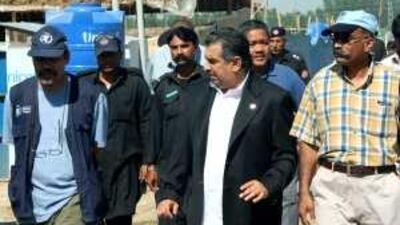ISLAMABAD // Refugees from Pakistan's ferocious anti-Taliban battles will die slowly if the world fails to meet a funding shortfall of US$300 million (Dh1.1 billion), the UN's special humanitarian envoy warned after visiting some of the two million people displaced by devastating offensives in the country's north-west. The United Nations has appealed for $532m to help shelter, feed and provide clean water and medicines for what it says is the world's worst refugee crisis since Rwanda in the 1990s. So far only 35.5 per cent of the funding request has been met, making this humanitarian effort one of the most under-funded in recent history, Abdul Aziz Arrukban, a former Saudi transport company director, said.
"There hasn't been a huge wave of deaths in this crisis. But these people, they will die slowly unless we get more help," Mr Arrukban said in an interview. "What I've been seeing in Pakistan, it's huge. This is the largest refugee crisis we at the UN have seen in the last 15 years. But it's not getting that much attention. Some countries are not taking it seriously." The crisis was "unprecedented, both in terms of the speed and scale of the displacement", the envoy said.
Mr Arrukban's appeal for greater funding came as up to 40,000 people were reported fleeing their homes in South Waziristan, before a major military offensive against Baitullah Mehsud, the Pakistani Taliban chief. In recent days fighter jets have hit suspected Taliban hideouts in the tribal district hugging the Afghan border, in a "softening-up" operation before a blitz on Mr Mehsud and his followers.
Mr Arrukban has worked on humanitarian crises in Iraq, Somalia, Sudan, West Africa, Afghanistan, the Palestinian territories and tsunami-affected Asia in his two years as the UN secretary general Ban Ki-moon's special humanitarian envoy and the previous two years as the World Food Programme's special international ambassador. "The [2004] tsunami appeal was funded within two weeks. The Pakistan earthquake of 2005 received more than 100 per cent of its requested funds. Donors have been fast to fund crises resulting from wars between two countries. But with this crisis, people are moving very slowly to give money," he said.
More than a million people have fled the Swat valley, a scenic tourist hub taken over by the Taliban in north-west Pakistan, since the military unleashed an air and ground offensive against the militants in early May. Half a million people had fled fighting in other parts of the North-West Frontier Province since last August. So far 1.9 million people have officially registered as refugees in a continuing verification process, UN officials say.
The coming monsoon season heightened the urgency of meeting current needs, Mr Arrukban said. The annual rains usually arrive in July and frequently cause destructive flooding. On a scale unseen in other crises, the majority of refugees have been taken in privately by relatives and friends in neighbouring districts. Host families are looking after several families at a time, leaving just 145,000 people to seek shelter in camps supported by the UN and other agencies, and in emptied schools. About 3,500 schools are now occupied by displaced families, living several to a classroom.
On Sunday, Mr Arrukban visited the Sheikh Shehzad refugee camp and privately hosted communities in Mardan, a district over the hills from Swat to where most people fled. He also visited a girls' high school that has become a temporary home to displaced families. "I was really touched. I've never seen this private hosting elsewhere in such large numbers. From what I can see it's a part of the culture here to help each other," he said.
"But all these host families need help, too. We are working with them to help provide food and other essential needs. But we need the international community to help us help the host families. In the camps, I would like to see better conditions. "In particular, the healthcare, sanitation and water systems are under enormous strain." He said $2m a day is needed to provide the refugees with decent living conditions.
Mr Arrukban is trying to galvanise international support for the humanitarian response, especially among Gulf Cooperation Council states. He appealed to Gulf countries to direct their donations, usually made bilaterally, through the United Nations' co-ordinated effort. "Ramadan is coming in just over six weeks and these people need some help. I hope to see Gulf countries collect money through telethons, like the Emirates and Saudi Arabia often do for crises," Mr Arrukban said.
"Most of the GCC countries make direct donations. I am hoping that in making their donations they will work with us closely, so we can manage the funds and ensure everyone gets an equal share. We don't want to see one town getting lots of help and the next town getting none. "Pakistan has a close relationship with the Gulf states. Hundreds of thousands of Pakistanis work in the Gulf. There is a long history between Pakistan and these countries."
bcurran@thenational.ae

